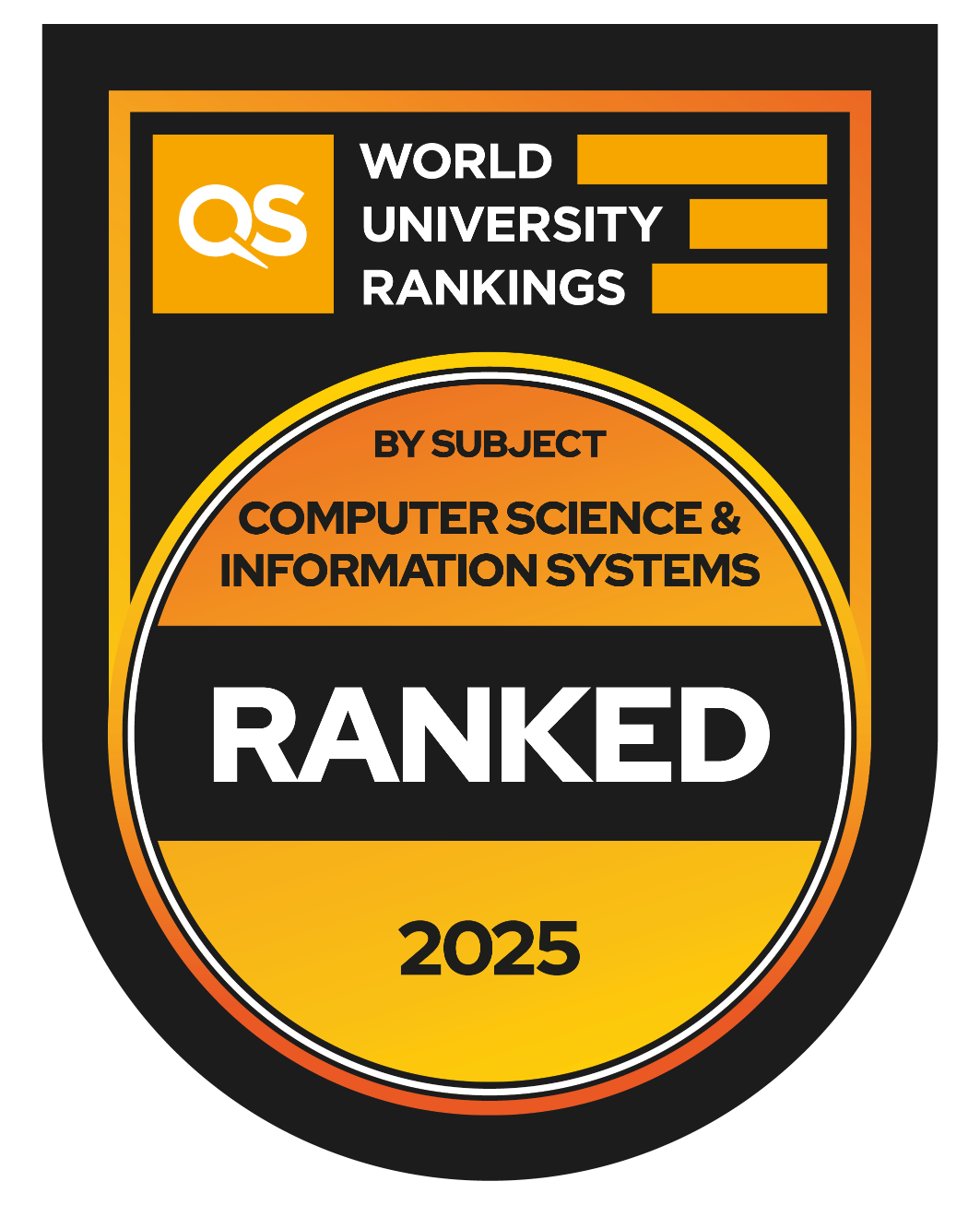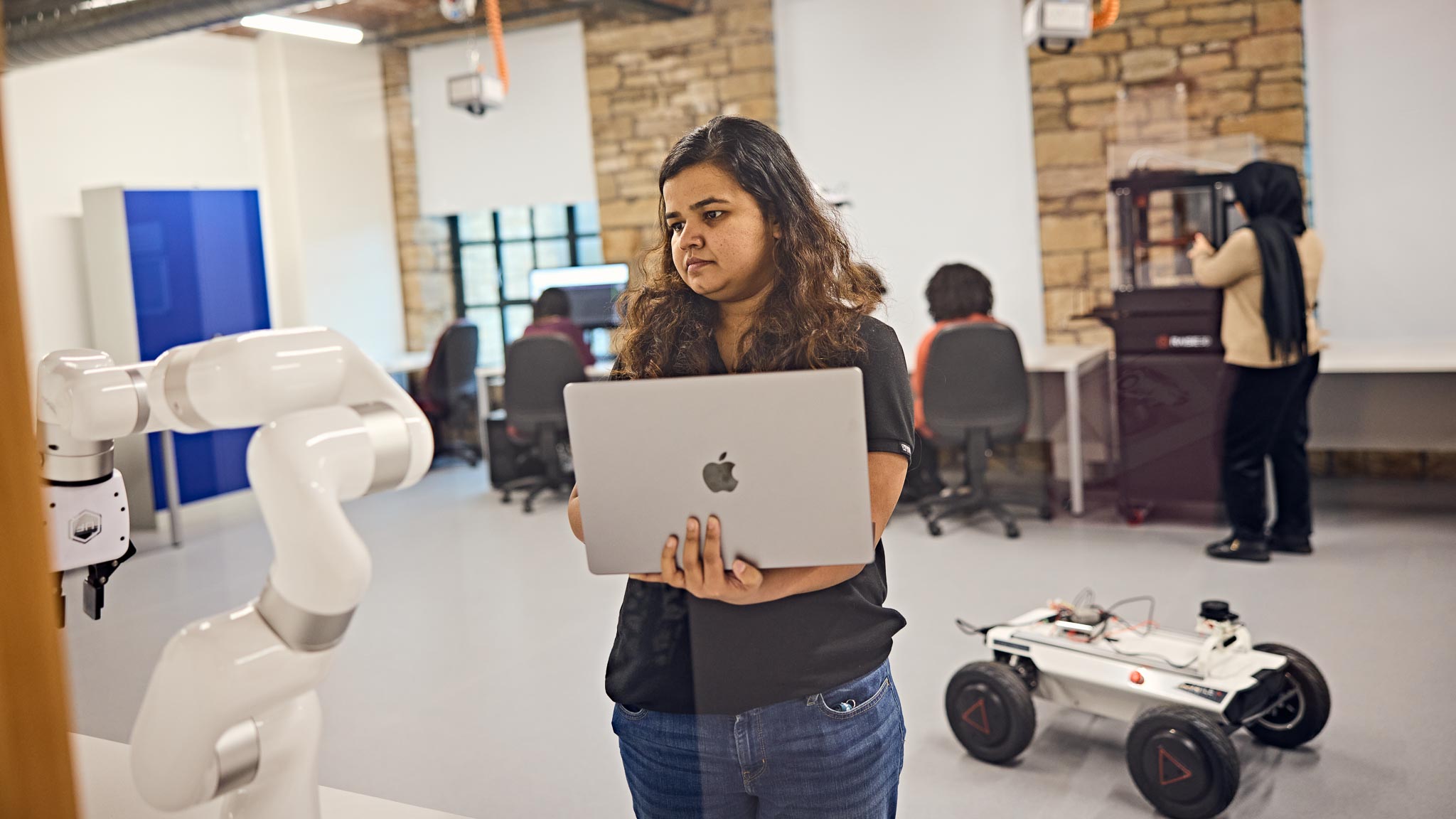
Artificial Intelligence MSc
Start Dates
21 September 2026, 11 January 2027, 17 May 2027
Duration
1 year full-time
Overview
Why choose Huddersfield for this course?
- Unique integration of symbolic, sub-symbolic, and hybrid AI methods.
- Research-active teaching staff with real-world AI projects.
- Build advanced knowledge in AI across machine learning, robotics, data-mining and autonomous systems.
Accreditation and Professional Links
Recognised connections to give you an extra edge when you graduate. Read More
In the UK, we have seen a huge expansion in artificial intelligence (AI) during the last decade, showcasing that the country’s economy is aiming to use intelligent technologies to position itself at the forefront of the digital revolution.
Data shows that the AI sector is worth over £16.8bn*. This means that AI has rapidly become a medium-sized sector in the UK, and has the potential to participate in other sectors' growth.
You could contribute to this growth by enrolling on our Artificial Intelligence MSc at The University of Huddersfield.
Why study Artificial Intelligence MSc at Huddersfield?
Demand for talent in AI techniques, such as machine learning, is increasing rapidly. There is a need to ensure the skills pipeline can meet the needs of industry now and in the future. This course, perfect for those with prior or specialist experience in Computing, aims to develop your knowledge and understanding to an advanced level across a range of areas, including:
- Machine Learning
- Data Mining
- Robotics
- Knowledge Graphs
- Autonomous Systems
We will equip you with an understanding of the fundamental approaches to implementing intelligent behaviour in machines. This should then enable you to match applications with appropriate AI techniques for their solution. You will also be able to construct and configure solutions using a range of AI technologies.
You’ll be taught by international experts in the field of AI. Our academic staff are active in exciting and pioneering research, applying AI methods to address societal changes in healthcare, transportation, smart cities and supply chains. Our research expertise spans the whole spectrum of modern AI, from automated planning and knowledge representation and reasoning, to statistical and data-driven AI, machine learning, deep learning and generative AI.
This course is fully accredited by the British Computer Society (BCS), the Chartered Institute for IT, and by completing it, you will have partially fulfilled the academic requirements for registration as a Chartered IT Professional and Chartered Engineer.
The University is nestled within the heart of Huddersfield, a warm and welcoming town, known for its friendly atmosphere and diverse community. When you’re not studying, you can enjoy an array of exciting activities and experiences. From cultural events and charming cafes to stunning scenery and fantastic transport links, there’s plenty to do in and around the town centre.
We also offer this course as a part-time Distance Learning route.
*Forbes
Career opportunities after the course *
Data Scientist
Machine Learning Engineer
Data Engineer
Software Engineer
Data Analyst
*Lightcast
Entry Requirements
Entry requirements for this course are normally:
- A BSc or BEng Honours degree (2:2 or above) in Computing or Engineering or related subject or an equivalent professional qualification
- Other qualifications and/or experience that demonstrate appropriate knowledge and skills at an Honours degree level
If your first language is not English, you will need to meet the minimum requirements of an English Language qualification. The minimum for IELTS is 6.0 overall with no element lower than 5.5, or equivalent. Read more about the University’s entry requirements for students outside of the UK on our International Entry Requirements page.
Course Details
Teaching and Assessment
Discover what to expect from your tutor contact time, assessment methods, and feedback process.
Your Career
The top five job titles advertised in the UK for graduate roles associated with Artificial Intelligence MSc courses are: Data Scientist; Machine Learning Engineer; Data Engineer; Software Engineer; and Data Analyst.
Source: LightcastTM data - job postings from December 2023 to December 2024 showing jobs advertised associated with a selection of relevant graduate roles.
98%
Percentage of the University's postgraduate students go on to work and/or further study within fifteen months of graduating.
* HESA Graduate Outcomes 2022/23, UK domiciled.
£38.5k
The average salary of our postgraduates fifteen months after graduating.
* HESA Graduate Outcomes 2022/23, mean salary, UK domiciled, full-time UK employment as main activity.
My time at the University of Huddersfield was instrumental in advancing my career. The course gave me the confidence and skills to address complex challenges in AI and software engineering. Although I was already in the industry, the new skills helped me adapt to emerging technologies and remain at the forefront of my field.
- Marco Dinacci
Artificial Intelligence MSc Graduate
Technical Lead at Apple
Fees and Finance
This information is for Home students applying to study at the University of Huddersfield in the academic year 2026/27.
Please note that tuition fees for subsequent years may rise in line with inflation (RPI-X) and/or Government policy.
From January 2027 the UK government is launching a new student funding system for people starting university education. Read more about the Lifelong Learning Entitlement (LLE).
For detailed information please visit https://www.hud.ac.uk/study/fees/
This information is for international students applying to study at the University of Huddersfield in the academic year 2026/27.
Please note that tuition fees for subsequent years may rise in line with inflation (RPI-X) and/or Government policy.
For detailed information please visit https://www.hud.ac.uk/international/fees-and-funding/
Optional short field trips e.g. one day, are sometimes also arranged. Previous field trips have included Bletchley Park. The costs of these field trips are heavily subsidised by the school but can sometimes incur a nominal cost and/or deposit of between £5 and £40 depending on the trip.
Scholarships and Bursaries
Discover what additional help you may be eligible for to support your University studies.
Tuition Fee Loans
Find out more about tuition fee loans available to eligible postgraduate students.
What’s included in your fee?
We want you to understand exactly what your fees will cover and what additional costs you may need to budget for when you decide to become a student with us.
If you have any questions about Fees and Finance, please email the Student Finance Team.
Gallery
See below for a glimpse at some of our facilities
Explore More
Why Hud
Explore the unique opportunities and resources that make our institution a top choice for students seeking a well-rounded and future-focused education.
More Info
Careers support
We know you’re coming to university to study on your chosen subject, meet new people and broaden your horizons. However, we also help you to focus on life after you have graduated to ensure that your hard work pays off and you achieve your ambition.
Find out more about careers supportStudent support
At the University of Huddersfield, you’ll find support networks and services to help you get ahead in your studies and social life. Whether you study at undergraduate or postgraduate level, you’ll soon discover that you’re never far away from our dedicated staff and resources to help you to navigate through your personal student journey.
See our support servicesTeaching Excellence
Great teaching is engaging and inspiring — it helps you reach your full potential and prepares you for the future. We don’t just teach well — we excel — and we have the awards and recognition to prove it.
Find out moreInspiring Academics
Our researchers carry out world-leading work that makes a real difference to people’s lives. Staff within the Department of Computer Science may teach you on this course.
Find out more about our staffResearch Excellence
You’ll be taught by staff who want to support your learning and share the latest knowledge and research.
Find out moreAccommodation
Looking for student accommodation? Huddersfield has you covered. HudLets has a variety of accommodation types to choose from, no matter what your preference. HudLets is the University’s approved accommodation service, run by Huddersfield Students’ Union.
Take a look at your optionsFurther Study
Many of our graduates stay at Huddersfield to complete postgraduate research degrees at Masters or PhD level.
Discover research degreesLegal information
When you enrol as a student of the University, your study and time with us will be governed by our terms and conditions, Handbook of Regulations and associated policies. It is important that you familiarise yourself with these as you will be asked to agree to them when you join us as a student. You will find a guide to the key terms here, along with the Student Protection Plan.
Although we always try and ensure we deliver our courses as described, sometimes we may have to make changes for the following reasons:
Changes to a course you have applied for but are not yet enrolled on
If we propose to make a major change to a course that you are holding an offer for, then we will tell you as soon as possible so that you can decide whether to withdraw your application prior to enrolment. We may occasionally have to withdraw a course you have applied for or combine your programme with another programme if we consider this reasonably necessary to ensure a good student experience, for example if there are not enough applicants. Where this is the case we will notify you as soon as reasonably possible and if you are unhappy with the change we will discuss with you other suitable courses we can transfer your application to. If you do not wish to transfer to another course with us, you may cancel your application and we will refund you any deposits or fees you have paid to us.
Changes to your course after you enrol as a student
Changes to option modules
Where your course allows you to choose modules from a range of options, we will review these each year and change them to reflect the expertise of our staff, current trends in research and as a result of student feedback or demand for certain modules. We will always ensure that you have an equivalent range of options to that advertised for the course. We will let you know in good time the options available for you to choose for the following year.
Major changes
We will only make major changes to non-optional modules on a course if it is necessary for us to do so and provided such changes are reasonable. A major change is a change that substantially changes the outcomes, or a significant part of your course, such as the nature of the award or a substantial change to module content, teaching days (part time provision), type of delivery or assessment of the core curriculum. For example, it may be necessary to make a major change to reflect changes in the law or the requirements of the University’s regulators or a commissioning or accrediting body. We may also make changes to improve the course in response to student, examiners’ or other course evaluators’ feedback or to ensure you are being taught current best practice. Major changes may also be necessary because of circumstances outside our reasonable control, such as a key member of staff being unable to teach due to illness, where they have a particular specialism that can’t be adequately covered by other members of staff; or due to pandemics, other disasters (such as fire, flood or war) or changes made by the government.
Major changes would usually be made with effect from the next academic year, but may happen sooner in an emergency. We will notify you as soon as possible should we need to make a major change and will consult with affected groups of students and any changes would only be made in accordance with our regulations. If you reasonably believe that the proposed change will cause you detriment or hardship we will, if appropriate, work with you to try to reduce the adverse effect on you or find an appropriate solution. Where an appropriate solution cannot be found and you let us know before the change takes effect you can cancel your registration and withdraw from the University without liability to the University for any additional tuition fees. We will provide reasonable support to assist you with transferring to another university if you wish to do so and you may be eligible for an exit award depending on how far through your course you are.
In exceptional circumstances, we may, for reasons outside of our control, be forced to discontinue or suspend your course. Where this is the case, a formal exit strategy will be followed in accordance with the student protection plan.
The Office for Students (OfS) is the principal regulator for the University.











